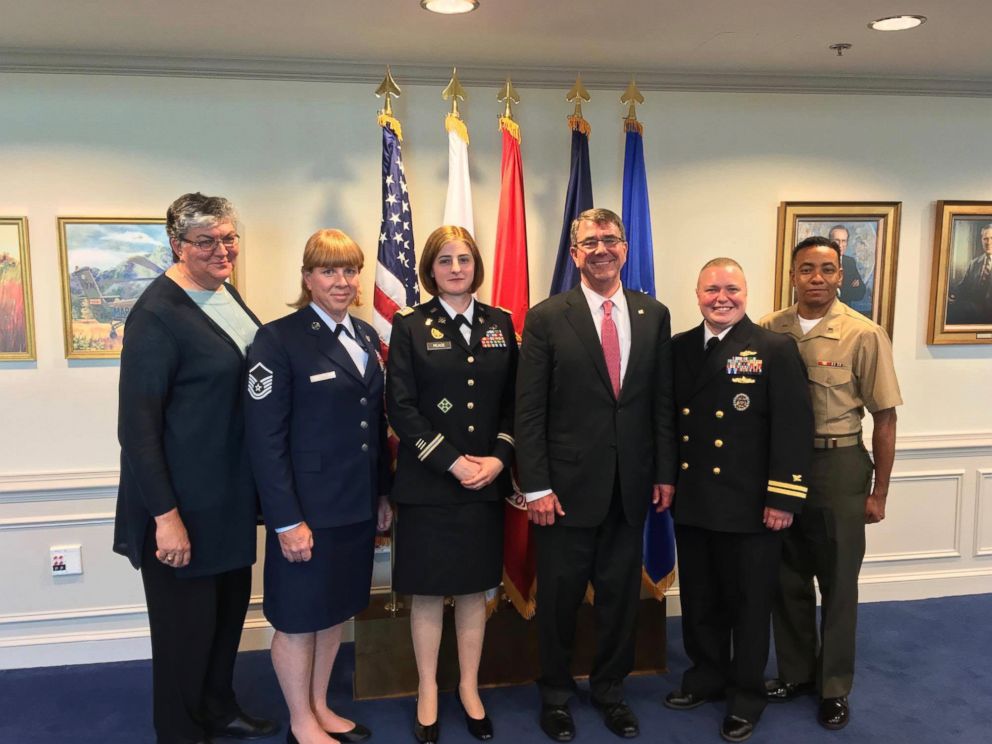Pentagon Lifts Ban on Transgender Service Members
The Pentagon announced the repeal of its ban on transgender service members.
— -- The Pentagon lifted the ban on transgender people serving openly in the military today, with Defense Secretary Ash Carter noting that the armed services "don't want barriers unrelated to a person’s qualifications to serve."
Carter made the announcement at a Pentagon news conference. The change is effective immediately.
Top Pentagon officials finalized details of the plan earlier in the week.
"The Defense Department and the military need to avail ourselves of all talent possible in order to remain what we are now — the finest fighting force the world has ever known," Carter said. "We don't want barriers unrelated to a person’s qualifications to serve preventing us from recruiting or retaining the soldier, sailor, airman or Marine who can best accomplish the mission."
The plan directs each branch of the armed services to implement new policies affecting recruiting, medical care, housing and uniforms for transgender troops. The military services will conduct training for commanders and medical personnel over the next 90 days who have transgender personnel in their units. Over the next nine months, there will be training for all military services and medical personnel.
"When the training is complete, no later than one year from today, the military services will begin accessing transgender individuals who meet all standards, holding them to the same physical and mental fitness standards as everyone else who wants to join the military," said Carter.
Last July he announced he would lift the ban and formed a task force to review how that process would commence. He directed the task force to work under the assumption that the ban would be lifted.
The task force's assessment continued beyond the original six-month deadline, and recommendations were not presented until February.
"All this represents a sea change from even a decade ago," said Carter. "It’s important that we do it."
According to a Rand Corp. study, an estimated 2,500 active service members out of 1.3 million are transgender, and about 65 service members seek to make a gender transition each year. The study determined that any medical or institutional costs associated with the policy change would be minimal.
Once the plan is fully in place, the military’s health care system will pay for gender reassignment surgery. Any treatment will be categorized as nonurgent and subject to a service member’s current readiness status.

Army Intelligence Officer Captain Jennifer Peace, who says she was “outed” to her command in January 2015, was one of a few service members who met with Carter in the week leading up to the announcement lifting the ban on transgender men and woman.
"Being transgender, for me this announcement is such a huge relief. It is very validating to hear," Peace told ABC News. "Transgender service members are qualified to serve and we support the nation’s readiness. It really hit home."
Peace says she has been transitioning since 2014 and has been in the military for 12 years. When she first was visibly making gender changes, she expressed how hard it was being forced to “maintain male grooming standards” and being in a place where “no one wanted me in either restroom.”
She helps counsel those serving in uniform who find themselves in similar situations to ensure they receive equal treatment.
She said it will help to have the support of the secretary of defense, and sees the attitudes of other service members starting to change overall.
"This is going to make things better, although there are still going to be speed bumps in the way. But now commanders will have guidelines,” Peace said.




